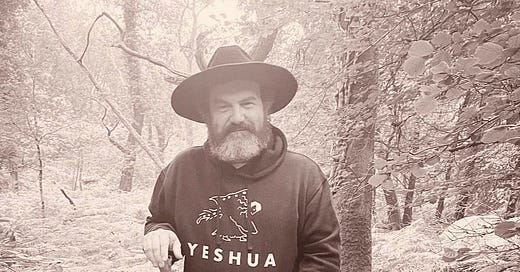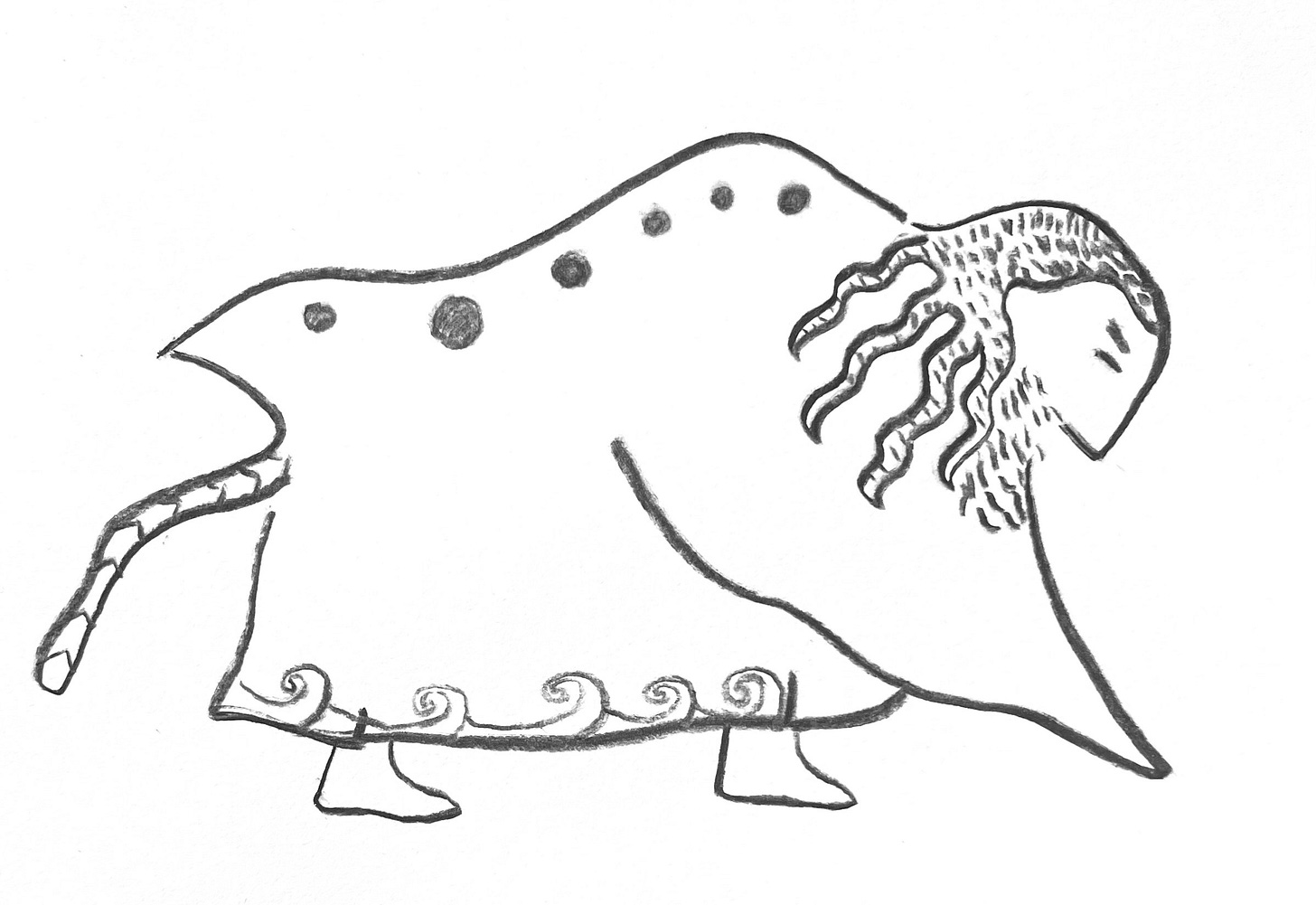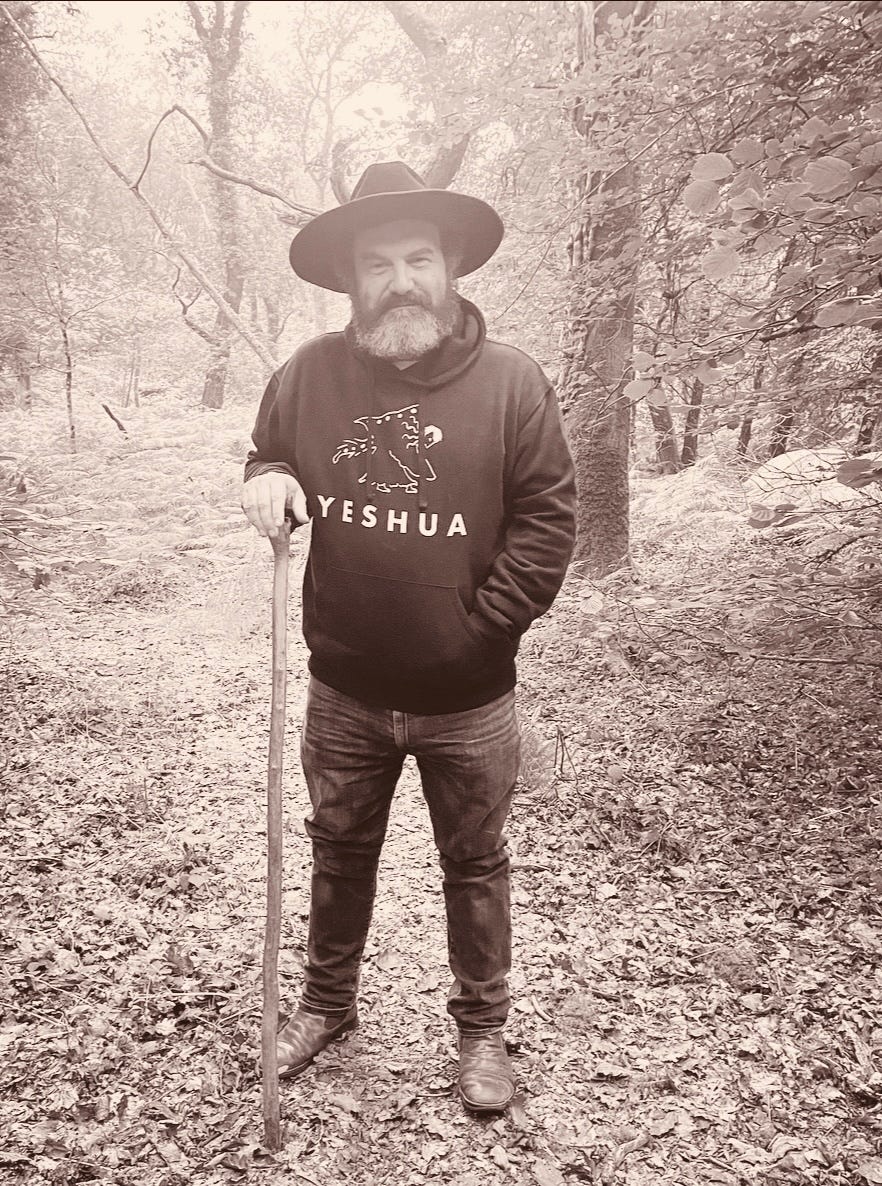He Wrote in the Dirt, author’s drawing
“As I’m saying in many different ways, we get peddled the feral when we long for the wild.”
It would have been right before I went onstage at the Greenbelt Festival a few weeks back. A lad caught my arm – You’re the ‘Wild Christ guy’, but Jesus’s not wild. He’s gentle and non-judgemental. Everyone’s alright with him. Wild is unsettling. What do you mean?
*
Is it right to call Christ wild? It depends what you mean by wild. I chewed on the word through a six-year PhD, countless hundreds of storytellings, spent a thousand nights under canvas and still it flips out of my hand like a salmon and is back in the stream.
If we think it means anti-all-authority, anti-discipline, anti-structure then I don’t think we’ve got anywhere near Yeshua. If we think he’s all groovy and ‘whatever’ then we’ve had a Facebook perspective on what he actually had to say. He’s hard to draw with one line. He seems austere one moment, generous and relaxed the next. That, in itself, is rather wild.
I think anti-all-authority and discipline is something that leads us to the feral, not to the wild.
The feral is the wild that’s lost its way. It’s a facsimile. It’s not the thing, it’s the absence of the thing, the pain of it not being there. At its heart feral is lonesome. With at-risk youth I worked for years to help feral kids transmute into wild kids, not tame kids. This issue was literally all I thought about, all I did, for eight years. I dumped everything else for this one privileged labour.
In contrast to much of what’s often presented to us these days, I believe wild is the state that God planned for us. Feral is what we end up with when we’re not quite synched with him yet. Wild as un-hypnotised, curious, loving, diligent, fierce when needed. And yes, also obedient. Feral is a domesticated energy that will often turn savage when it finally leaps the fence. And again, the wild and the savage are not quite the same thing. As I’m saying in many different ways, we get peddled the feral when we long for the wild.
I think we can get befuddled over the word wild rather like we can over myth: wild as a bar room brawl, myth as a fiction, a lie. I’m petitioning these aren’t the case in my approach.
The wild in the small way I’ve come to understand it over the last thirty years is filled with hierarchies, filled with repetition, as much connected to sober listening as to ecstatic states. Probably more so. When I headed out into the hills years ago I was to be educated in ways I did not expect. Far less glamorous, much more exacting.
My four years in a tent had me aspiring (and likely failing) to some of the longings of an early Christian in the West Country of England. It wasn’t quite what I expected. I learnt to keep my wicks trimmed and my lanterns clean from grime, to never, ever leave food out when I went to sleep, to pay attention to my dreams and discern the difference between solitude and isolation. There were no screens and no electrics anywhere near my canvas circle over those years. I didn’t have the biblical language but I was absolutely searching for a deep encounter and surely I found one.
A note: most modern people should not go seriously long periods on your own in the woods. I’m talking months not four days. You are as likely to go mad as you are to become holy, and there’ll be no one to tell you the difference. Be careful. I’m cautious about that particular romanticism. There are a few folk really wired for it, but most would benefit from something a little more moderate. Not bland, not compromised, but careful steps.
My emphasis about Wild Christ and its connection to nature is not to imply that Christ constantly taught against civilisation, it’s more a mercy-mission for the over- domesticated, rather breathless conditions that many of us Christians find ourselves in these days. That as technology contorts and free-ranges its myriad ambitions over our attempts to stay connected to a ‘still small voice’ we are facing levels of distraction we never have before. We need that ‘wild’ word now, because of the legacy we see writ all round us. We also need kindness, wisdom, and flat-out courage. We need the disturbing acuity of Christ’s gesturing beyond the things of this world.
Wild, the real wild, is, for me, listening to Yeshua and trying to foolishly and wonderfully follow the treasury he is demonstrating. And yes, I get it. He’s not John the Baptist, he’s somehow an ascetic and also not an ascetic. He upsets everyone, from one angle or another, even his own family at times. I appreciate he’s not banging on day and night about wilderness vigils, but he certainly did one. And I very much doubt that two thousand years ago by the sea of Galilee, there was quite such an urgent need as today to get in touch with Moriarty’s ‘bush soul’. But even so, it’s where our druid is often found praying. The quiet, shadowy places, before the intensity of his days begin.
This fugitive-born God-Man, our Outlaw-King, is not pointing towards the wildness of a Harley Davidson, or unbridled eros, he’s hardly endorsing a plundering of the passions. His words are leaner than that, stranger than that.
There are other words in other times you could affix to him: Gentle-Christ, Funny-Christ, Scary-Christ, Obedient-Christ. At different moments of our lives we will need to seek out and learn from all those different aspects.
But right now, with the chloroform of the secular settling on us hourly, with pleasure unseating goodness regularly, I come to the conclusion that yes, the message of Christ in the face of the world is properly counter-cultural, properly, sophisticatedly, wild.
On the matter of location. I could probably make a fortune if I said seek the desert inside you and you don’t have to move a muscle. That’s a yes and no kind of issue.
If we immediately interiorise the desert, or the forest or mountain top as internal motifs, we’ve lost the incredible way in which God can communicate with us out there in those places. Often in a fairly literal, sensual, startling manner. It’s usually not the same as sitting in your cell/bungalow – wiser people than me will tell you it is – but I can’t condone our usual living conditions as having the same kind of spiritual vivacity as a wood or sacred hill. No doubt I can be chapter and versed on this, but for modern people we often can’t get profoundly ‘inside’ until we’ve been profoundly ‘outside’.
Surprise your retinas, take a walk, sit out at dusk especially. If you live in a city try and find a park. Show fidelity, keep visiting. Make a prayer and expect a response. Submit to a discipline: carve a holy icon. Make a small fire at the bottom of your garden and read the gospel of John with a few friends, I’m sure many of you do already. It doesn’t all have to be high-drama renunciation, a regular practice would be far more impactful.
“I have come home at last! This is my real country! I belong here. This is the land I have been looking for all my life, though I never knew it till now…Come further up, come further in!”
C.S. Lewis, The Last Battle
You can probably tell I’ve come back from the forest but it’s clearly not done with me.
There’s lots to chew on and re-organise over the winter. You can’t go out there and not expect the appropriate trouble. I must remind myself of this. I truly didn’t want to break camp and return this time. I located something fresh; it was like drinking from the cleanest spring imaginable.
And now, I want to bring in the end of my Cornwall pilgrimage over the summer, all the saint searching. These characters energise us with their pluck, push us on. So here’s a little history.
PART THREE OF THE CORNWALL PILGRIMAGE





